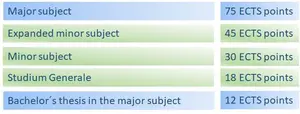Structure and Curriculum
Information on the structure of bachelor's degree programmes with multiple subjects
As well as core competences in Modern German Literature, Medieval German Literature and German Linguistics, the Bachelor of Arts in German Language, Literatures and Cultures incorporates the practically oriented sub-discipline of Literature and Mediation. The standard programme duration is six semesters. The Bachelor's degree programme is available in the following variations:
- Major subject (75 ECTS points)
- Minor subject (45 ECTS points)
The specialist bachelor's degree course in German Language and Literature consists of one foundation module and two advanced modules in each of the three sub-disciplines ofModern German Literature, Medieval German Literature and German Linguistics.
The fourth sub-discipline of ‘Literature and Mediation’ consists of practically oriented modules (one foundation module and one advanced module), which are chosen from the two specialisms of Impartation of Literature and Didactics of German Language and Literature.
The foundation modules of Modern German Literature, Medieval German Literature and German Linguistics are mandatory for anyone studying German Language and Literature as a major or minor subject. They should be completed in the first two semesters.
Students studying German Language and Literature as a major subject must take two advanced modules in each of the three sub-disciplines of Modern German Literature, Older German Language and Literature and German Linguistics. They must take one foundation module and one advanced module in the sub-discipline of Literature and Mediation. Students writing their bachelor’s thesis in German Language, Literatures and Cultures take an advanced module in the programme’s particular sub-discipline on which the bachelor’s thesis will be based (Modern German Literature, Medieval German Literature, German Linguistics) instead of the follow-on module ‘Literature and Mediation’.


